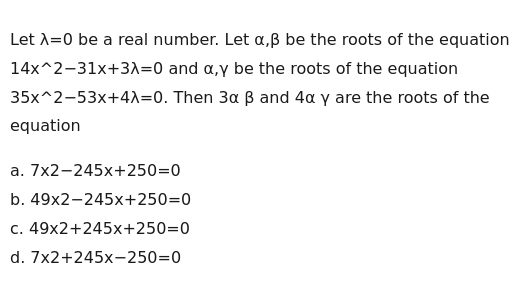Question
Question: Let λ=0 be a real number. Let α,β be the roots of the equation 14x^2−31x+3λ=0 and α,γ be the roots ...
Let λ=0 be a real number. Let α,β be the roots of the equation 14x^2−31x+3λ=0 and α,γ be the roots of the equation 35x^2−53x+4λ=0. Then 3α β and 4α γ are the roots of the equation

7x2−245x+250=0
49x2−245x+250=0
49x2+245x+250=0
7x2+245x−250=0
49x2−245x+250=0
Solution
Let the given equations be:
- 14x2−31x+3λ=0 with roots α and β.
- 35x2−53x+4λ=0 with roots α and γ.
Since α is a common root, it satisfies both equations:
14α2−31α+3λ=0 (3)
35α2−53α+4λ=0 (4)
Eliminate λ from (3) and (4). Multiply (3) by 4 and (4) by 3:
56α2−124α+12λ=0
105α2−159α+12λ=0
Subtracting the first from the second:
(105α2−159α+12λ)−(56α2−124α+12λ)=0
49α2−35α=0
7α(7α−5)=0
From equation (1), the product of roots is αβ=143λ.
From equation (2), the product of roots is αγ=354λ.
If α=0, then 3λ/14=0⟹λ=0 and 4λ/35=0⟹λ=0. The question states λ=0 (implied by the similar question context). Thus α=0.
So, 7α−5=0⟹α=75.
Substitute α=75 into equation (3):
14(75)2−31(75)+3λ=0
14(4925)−7155+3λ=0
72×25−7155+3λ=0
750−7155+3λ=0
−7105+3λ=0
−15+3λ=0⟹3λ=15⟹λ=5.
Now find the values of β and γ.
From equation (1), αβ=143λ. Substitute α=75 and λ=5:
75β=143×5=1415
β=1415×57=23.
From equation (2), αγ=354λ. Substitute α=75 and λ=5:
75γ=354×5=3520=74
γ=74×57=54.
The question asks for the equation whose roots are β3α and γ4α.
Let the new roots be r1=β3α and r2=γ4α.
r1=3/23×(5/7)=3/215/7=715×32=75×2=710.
r2=4/54×(5/7)=4/520/7=720×45=75×5=725.
The sum of the new roots is S=r1+r2=710+725=735=5.
The product of the new roots is P=r1×r2=710×725=49250.
The quadratic equation with roots r1 and r2 is x2−Sx+P=0.
x2−5x+49250=0.
To obtain integer coefficients, multiply the equation by 49:
49x2−49×5x+49×49250=0
49x2−245x+250=0.
